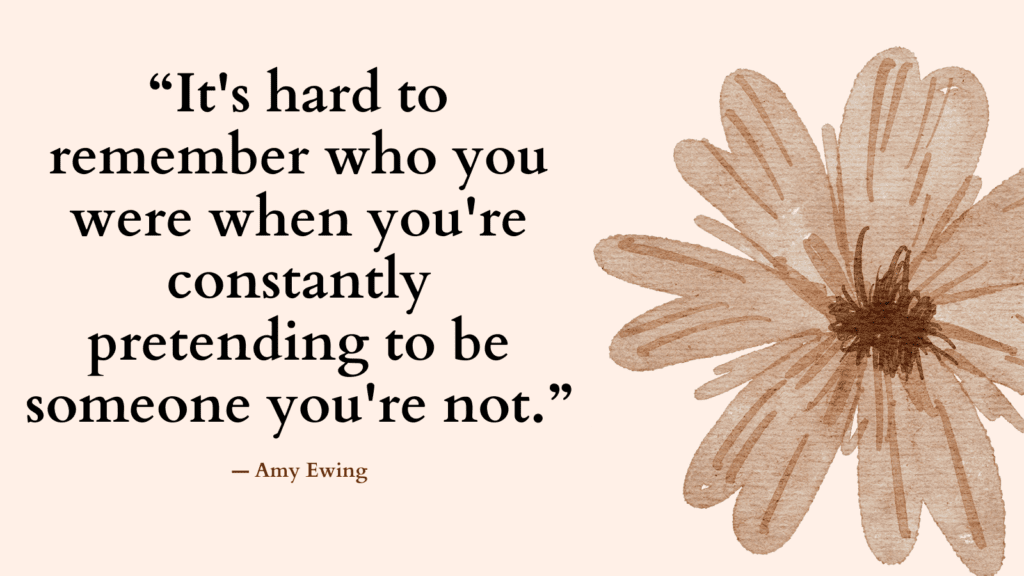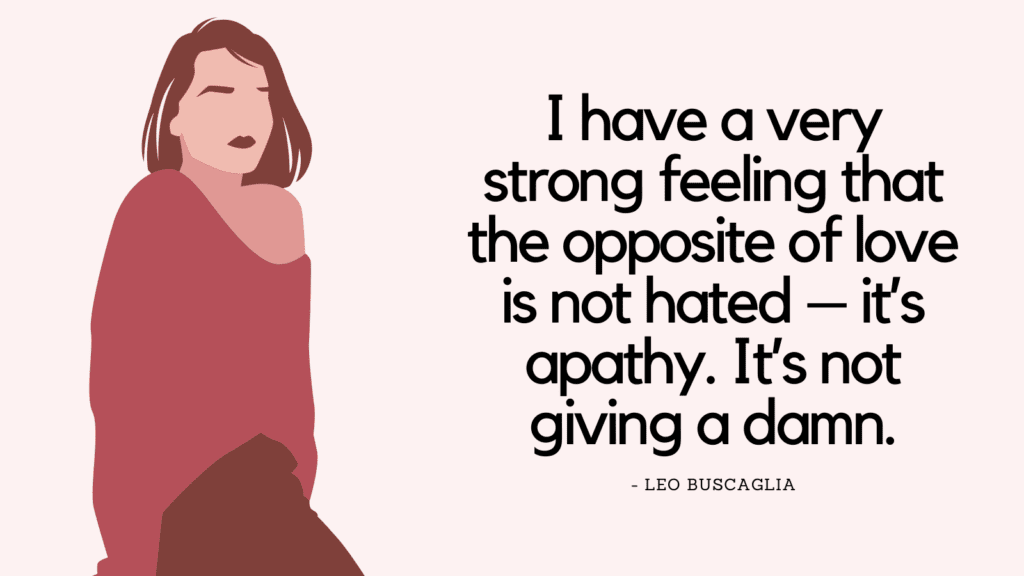This post contains some of the best of toxic positivity quotes that will inspire you to become more self-accepting.
What Is Toxic Positivity?
Toxic positivity is the belief that no matter how difficult the situation is, we should maintain a positive mindset or “good vibes only”.
While it’s helpful to engage in positive thinking, toxic positivity takes positive thinking to an overgeneralized extreme. It rejects difficult emotions and maintains a false façade.
Truth is, life isn’t always positive and we all have to deal with painful emotions and experiences, and suppressing them won’t make them go away.
If anything, what you resist, persist.
Eventually painful emotions build up and come out in ugly, self-sabotaging ways.
Toxic Positivity Statements
- “Good vibes only”
- “Be grateful”
- “Be optimistic”
- “Don’t be so negative”
- “Look on the bright side”
- “There’s a silver lining”
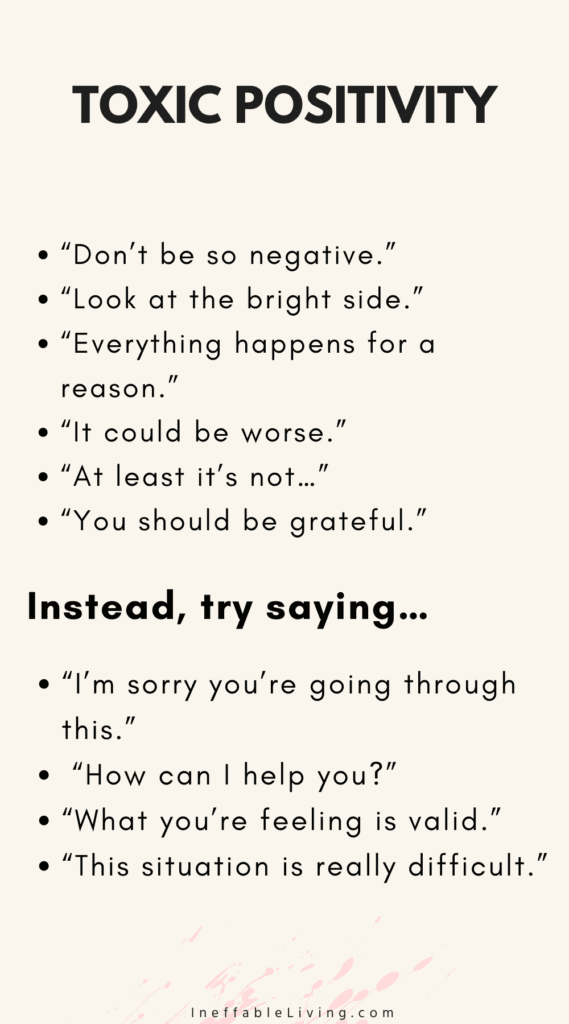
Toxic Positivity Quotes
1. “We think that denying our emotions makes us stronger and more resilient, but the research shows that it actually makes us LESS resilient.” — Brené Brown
2. “Contrary to popular belief, there are no negative emotions. There are only emotions that are harder to experience or that cause more distress for certain people, and the more you suppress those emotions, the harder they are to manage.” — Whitney Goodman
3. “Discomfort is the price of admission to a meaningful life.” — Susan David
Related: How To Validate Someone’s Feelings Without Agreeing? (+Examples of Validating Statements)
4. “Everything worthwhile in life is won through surmounting the associated negative experience. Any attempt to escape the negative, to avoid it or quash it or silence it, only backfires. The avoidance of suffering is a form of suffering. The avoidance of struggle is a struggle. The denial of failure is a failure. Hiding what is shameful is itself a form of shame.” — Mark Manson
5. “Feelings or emotions are the universal language and are to be honored. They are the authentic expression of who you are at your deepest place.” — Judith Wright
6. “Feelings or emotions are the universal language and are to be honored. They are the authentic expression of who you are at your deepest place.” — Judith Wright
7. “Hope confronts. It does not ignore pain, agony, or injustice. It is not a saccharine optimism that refuses to see, face, or grapple with the wretchedness of reality. You can’t have hope without despair, because hope is a response. Hope is the active conviction that despair will never have the last word.” — Cory Booker
Related: How To Sit With Painful Emotions? (Top 9 Difficult Emotions)
8. “Hope is an embrace of the unknown and the unknowable, an alternative to the certainty of both optimists and pessimists. Optimists think it will all be fine without our involvement; pessimists adopt the opposite position; both excuse themselves from acting.” — Rebecca Solnit
9. “I always like to look on the optimistic side of life, but I am realistic enough to know that life is a complex matter.” — Walt Disney
10. “I am a human being, with feelings and emotions and scars and flaws, just like anyone else.” — Josh Gordon
11. “I am highly suspicious of attempts to brightside human suffering, especially suffering that — as in the case of almost all infectious diseases — is unjustly distributed. I’m not here to criticize other people’s hope, but personally, whenever I hear someone waxing poetic about the silver linings to all these clouds, I think about a wonderful poem by Clint Smith called “When people say, ‘we have made it through worse before.’” The poem begins, “all I hear is the wind slapping against the gravestones / of those who did not make it.” As in Ibn Battuta’s Damascus, the only path forward is true solidarity — not only in hope, but also in lamentation.” — John Green
Related: Top 21 Emotional Writing Prompts To Process Emotions
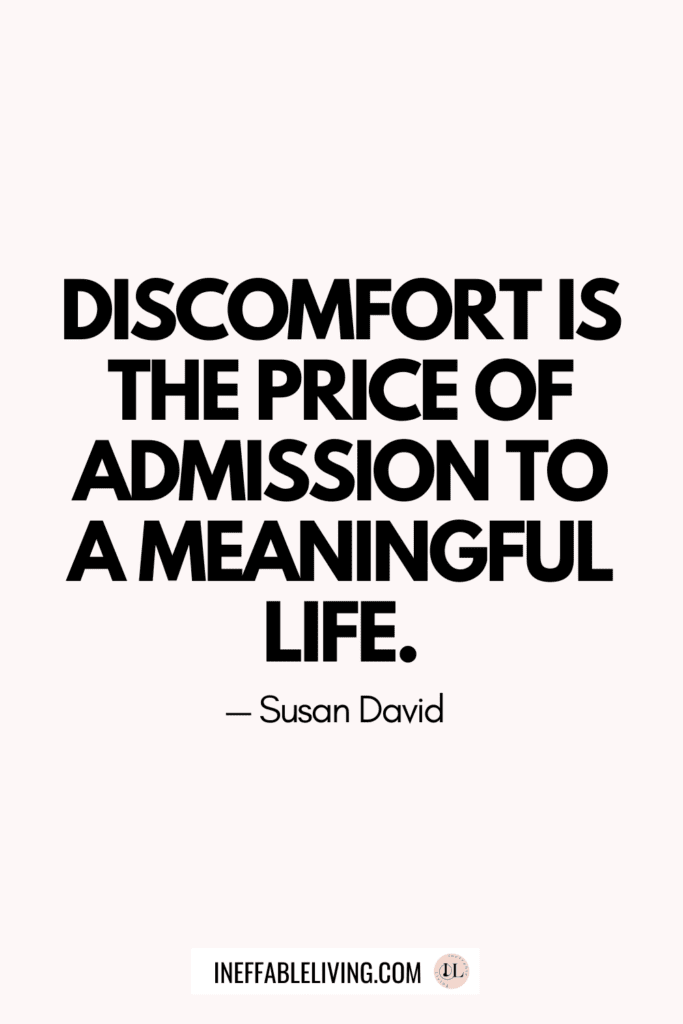
12. “In my work, I’ve noticed that people with invisible illnesses or disabilities are scared of acting too positive because then people won’t believe that they’re sick. They’re afraid of being too negative because then they aren’t being strong or fighting hard enough. They can’t win.” — Whitney Goodman
13. “Live a life that challenges you, fulfills you, has meaning, and brings you moments of joy. Open yourself to all emotions and experiences. Discover what you value and follow it until the end, knowing that sometimes life is going to hurt and that’s what makes it worth living.” — Whitney Goodman
14. “Sometimes being a friend means mastering the art of timing. There is a time for silence. A time to let go and allow people to hurl themselves into their own destiny. And a time to prepare to pick up the pieces when it’s all over.” — Octavia E. Butler
15. “Sometimes positivity is just denial.” — Whitney Goodman
16. “The pessimist complains about the wind; the optimist expects it to change; the realist adjusts the sails.” — William Arthur Ward
Related: The Difference Between Pain And Suffering (+Top 4 Tips On How To Embrace Pain & Stop Suffering)
17. “Toxic positivity is a cultural force that reinforces: “If you believe it you can achieve it!” “The only thing in your way is you!” “The key to success is a positive mindset!” “If you want to be healthy you must be positive!” “God will never give you more than you can handle!” … Toxic Positivity leaves us feeling alone, and disconnected. It stops us from communicating. It stifles creativity and change. It silences people. It labels things as “happiness inducing” and “happiness preventing.”” — Whitney Goodman
18. “Toxic positivity is forced, false positivity. It may sound innocuous on the surface, but when you share something difficult with someone and they insist that you turn it into a positive, what they’re really saying is, My comfort is more important than your reality.” — Susan David
19. “We cannot selectively numb emotions, when we numb the painful emotions, we also numb the positive emotions.” — Brené Brown
20. “What I am trying to cultivate is not blind optimism… but radical hope.” — Junot Diaz
21. “When people we love are suffering, we want to make it better. But sometimes — often, in fact — you can’t make it better. I’m reminded of something my supervisor said to me when I was a student chaplain: “Don’t just do something. Stand there.” — John Green
Related: Best 99 Coping Skills (+FREE Coping Worksheets)
22. “When we honestly ask ourselves which person in our lives means the most to us, we often find that it is those who, instead of giving advice, solutions, or cures, have chosen rather to share our pain and touch our wounds with a warm and tender hand.” — Henri Nouwen
23. “You can’t think your way out of feeling. Understanding why someone did something hurtful won’t always make it hurt less. Developing an understanding of why something is happening and making those connections is important. Without awareness there is no change.” — Unknown
FREE Validating Statements Worksheet
What To Say Instead?
- “How are you feeling about this?”
- “What has this experience been like for you?”
- “I’m sorry you’re going through this.”
- “You did the best you could at that time.”
- “How can I best support you right now?”
- “Thank you from sharing your experience with me.”
- “I’m sorry you’re not feeling well.”
- “It’s okay to cry and feel sad.”
- “I’m here for you.”
- “Is there anything I can do to support you?”
- “Do you want to talk about it?”

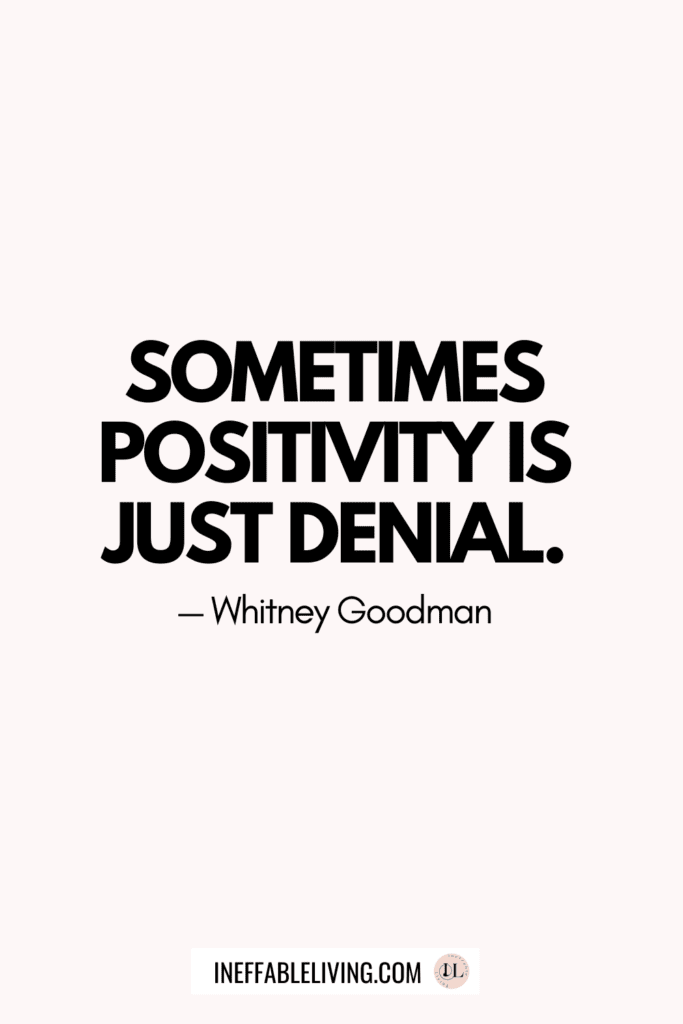
References
- Toxic Positivity: Definition, Research & Examples – The Berkeley Well-Being Institute (berkeleywellbeing.com)
- Toxic Positivity in Psychology: How to Avoid the Positivity Trap (positivepsychology.com)
- What Is Toxic Positivity? | Right as Rain (uwmedicine.org)
- Toxic positivity: Definition, risks, how to avoid, and more (medicalnewstoday.com)
- Toxic positivity is ‘counterproductive and harmful’ to mental health, experts say – The Washington Post
